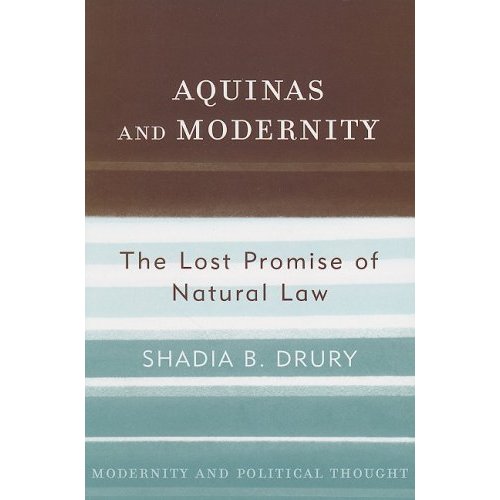
While an academic tome on arch-theologian Thomas Aquinas may not sound like the secular rationalist’s natural choice of bedtime reading, Shadia Drury’s contribution to the “Modernity and Political Thought” series is worth a second glance. More hatchet-job than hagiography, Aquinas and Modernity catalogues the Angelic Doctor’s numerous faults in a clear-eyed, indeed ruthless manner that will appeal to even the most jaundiced sceptic.
Though there is evidence that she would wish to, Drury will have a far harder time preaching to the converted. Catholics among her readership may be inclined to dismiss her as a Lutheran apologist, but the rather pallid brand of spirituality she recommends – wherein God is grudgingly included “among the good things in life” – seems unlikely to appeal to theists of any description.
Sometimes inelegant, often hyperbolic, Drury surely overstates her case a touch when asserting, for instance, that “the ‘science’ of theology is based on nothing more than the authority of scoundrels” or that ecclesiasts accorded power have “a vested interest in making the world as miserable as it can be”. As for her claim that “there is a strong probability that Aquinas may have recommended the execution of the boy king [Konradin von Hohenstaufen]” – this reviewer would need some convincing that it even makes sense.
Drury is right, however, to insist that her account provides a useful corrective to the reverential whitewashes offered by Thomists from the 13th century to the present day. Aquinas’s defence of the Inquisition hasn’t received the scrutiny it warrants and his reputation as a champion of reason, as Drury convincingly argues, doesn’t survive much investigation. Indeed Aquinas could more plausibly be counted a fideist than a rationalist, subjugating reason to faith and, ultimately, to the authority of the church.
An ad hominem polemic, though, can only ever be of limited interest and Drury’s obvious delight in pointing out Aquinas’s misdemeanours seems to have distracted her from her more positive and progressive ambitions. Both the series editors’ introduction and Drury’s own preface to Aquinas and Modernity: The Lost Promise of Natural Law advertise it as an attempt to recoup that loss and chart “a way out of the philosophical paralysis into which philosophy has been plunged in the postmodern age”. While we might wonder in passing what non-philosophical paralyses philosophy could have been expected to plunge into, we must applaud Drury’s aspiration if not her phrasing. Her intent is to reaffirm the value of modernity in the face of postmodern nostalgia for the dark ages, a cynical stance which represents the height of intellectual irresponsibility at a time when theocratic elements are infiltrating politics and stoking conflicts across the globe.
A secularised version of natural law theory is, Drury argues, the most appealing alternative. Richer than legal positivism, with its claim that in order to justly command obedience a legal system need only be “viable” (Drury rightly points out that Nazism and South African apartheid, among other abhorrent regimes, met this minimal requirement), natural law is nonetheless morally “thin” enough to accommodate a wide variety of world-views, providing a grounding for fruitful discussions between them.
Drury’s mistake is in consigning her discussion of natural law to the book’s final chapter. This leaves her no space to examine Aquinas’s blueprint of the theory, and, more seriously, squeezes the account of her own promising version into a mere three pages. Aquinas and Modernity, then, is twice over the story of a propitious project gone to waste, and readers wearied after five solid chapters of saint-bashing may well find themselves lamenting the lost promise of The Lost Promise…
Aquinas and Modernity is published by Rowman and Littlefield

